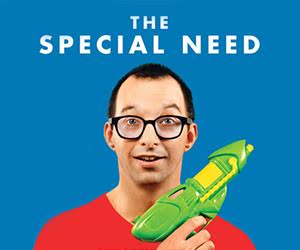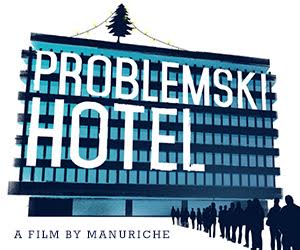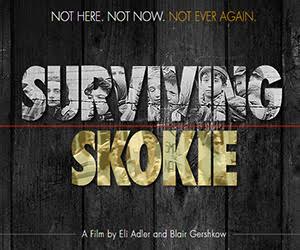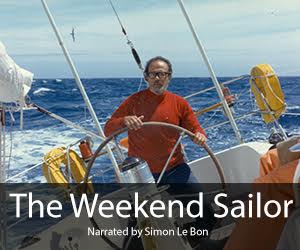
Filmmaker Manu Riche – The Problemski Hotel
Film Courage: What films inspired you growing up?
Manu Riche: Everything I was able to see on our two public broadcast channels. There were 7 channels on my TV set in the seventies! But I was actually a big fan of Jacques Tati films. I also watched Westerns, Lawrence of Arabia, and my very first emotional feeling of something more in cinema was Les quatre cents coups (a.k.a. THE 400 BLOWS) of François Truffaut. This film I saw with my two neighborhood friends one afternoon!
“I am always wondering how I can document reality in such a way that it doesn’t feel false. I know that reality is just a construction of reality, but I want it to be accurate and poetic!”
Manu Riche, PROBLEMSKI HOTEL Filmmaker
Film Courage: Did you go to film school?
Manu: No, I didn’t go to film school. I was afraid of schools and still am actually. I didn’t want to become a filmmaker in the first place. I started with theatre and am still working in that field, too. I just don’t make any distinctions between all these genres. I am always wondering how I can document reality in such a way that it doesn’t feel false. I know that reality is just a construction of reality, but I want it to be accurate and poetic!
Film Courage: When were you introduced to Dimitri Verhulst’s novel of which PROBLEMSKI HOTEL is based on? How many times did you read it?
Manu: I‘m reading all the time, so I never remember when I started to read a specific book, but a long time ago for sure. To film the book occurred somewhere in 2006. We started the production, financing and everything in 2010 I think. The book was published in 2001, Dimitri is a precursor, his book was visionary. We didn’t know it would be a crisis like that when we started the shooting of the film. And a mess it is!
Film Courage: What drew you to this story? How much of his original story did you want to keep the same and how much did you want to vary?
Manu: It is an organic process with Steve Hawes (my scriptwriter). We decide to do something, he writes a few pages with ideas we’ve discussed before. Then we read aloud what was written and I propose new things. It is very time consuming, but it is only way I can write a script, because I can only see the film, not write it…and I change until the very end, even during the shooting, but again, the shooting is also very organic. Basically all films are about people together or alone and my job is to observe what could happen.

Watch the Problemski Hotel here on Vimeo
Film Courage: Which character is most like you in PROBLEMSKI HOTEL and why do you identify with them?
Manu: Bipul, because he is in and out.
Film Courage: The lead actor in PROBLEMSKI HOTEL (Bipul) played by Tarek Halaby carries the film beautifully and lends a paternal figure around what all characters in the film center around. Where did you meet him? His only IMDB credit is this film. Had he done theater or other foreign productions before? How did you know he would work out so perfectly?
Manu: I didn’t know it would work out perfectly, but I met him years ago as a dancer. He is not an actor, he is a professional dancer, who works with great choreographers like Anne Theresa De Keersmaecker. It was the first for him before a camera.
I wanted somebody who would be very graceful and fragile and definitely not macho, and he needed to have an inner strength. Tarek was able to offer that and more. He is also able to stand still, most actors always want to do something, he was very good in standing still. Very difficult!

Actor Tarek Halaby
Film Courage: Did any of the actors in PROBLEMSKI HOTEL add dialogue or anecdotes to their scenes having experienced similar life situations? Did you encourage them to bring their own feelings to the roles?
Manu: All the characters experienced exile somehow. Tarek is a Palestinian refugee, Mahsun come from Kurdistan. We adapted the script to their own life, like Evgenia Brendes (Lydia), she fled Kazachstan with her parents 12 years ago and arrived here in Belgium, studying acting in Antwerp and now she is a great actress! I asked them to come with their history to the film set!
Film Courage: Where did you shoot the film/secure the locations?
Manu: I was very lucky that the biggest bank building in Brussels was about to be demolished. I negotiated with BNP Fortis bank and guess what? They agreed to give us two enormous floors on the upper levels. I wanted to have a place somehow above the city, like detached, like a spaceship. In the end the film is about people confronted with architecture and geography that somehow try to fence them in.

Actress Evgenia Brendes
Film Courage: Can you share the decision to shoot the film in a non-linear fashion, similar to a dance that shares qualities of the dance scenes in the movie?
Manu: Indeed we did not shoot in a linear fashion, definitely because of the schedule, but we had a time structure, though very loosely, they’re going in the direction of the Christmas feast. That is the timeline imposed by the rulers of the place. They want a Christmas party for the refugees. What an odd idea, no? But at the other hand I quite liked the idea of the party and the dance, because humans always end up dancing!
Film Courage: How is the work between takes with actors (or subjects) the same or different for you with a narrative film versus documentary film work?
Manu: No. It is the same! I don’t work with actors. I work with human beings.

Watch the Problemski Hotel here on Vimeo – Actor Gorges Ocloo
Film Courage: What camera(s) and other equipment did you use for the shoot?
Manu: Ask the best unknown DOP of the world, Renaat Lambeets.
Film Courage: Where is PROBLEMSKI HOTEL currently available to watch?
Manu: I’ve heard that it is distributed in different countries and on all sorts of platforms (here is a link to watch it on Vimeo), Youtube, iTunes, in the good cinemas, and a lot of festivals …
A film by Manu Riche. Based on the novel by Dimitri Verhulst
Available to watch February 7, 2017
Film Courage: Can you share the symbol of the Christmas tree which enters into the film in many scenes? What does this represent?
Manu: Is it a symbol? People tend to place a tree in this continent, absolutely ridiculous and absurd. But I do it myself and every year again it is a discussion in my household. Somehow that tree is my yearly fight with my wife!

Film Courage: What does the idea of hope mean to you?
Manu: Oh, hope. It is an illusion. We probably need it, but it also brings a lot of misery. It is better to live and see what happens instead of hoping to see something happening!
Film Courage: Most of the characters in the film are international and the story takes place in Belgium. We’re curious why you chose most scenes to be English speaking and little use of subtitles in the film (except for a few dialogue exchanges)?
Manu: Well it is set in a city in Belgium, but when you’re a refugee you don’t know what that represents. It is a name, people talk to each other. Though spoken language is only one way of communicating and somehow the people in the center were speaking a new language. A mixture of all these languages, let’s call it Babels…difficult to subtitle that. It is sometimes good to position and displace the audience in a place where they don’t understand everything.
Film Courage: What do you want audiences to gain from watching PROBLEMSKI HOTEL? How can non-refugees help better understand the journey of these individuals?
Manu: The best way to help is to talk with them! They are very fine people, just like you and me (sometimes).
Film Courage: What is your favorite book on filmmaking?
Manu: I re-read the interviews in the Cahier du cinema of the seventies and eighties.
Film Courage: What’s next for you creatively?
Manu: Finishing a documentary and starting a new film with Tilda Swinton and Pipo Delbono, though they don’t know it yet!

Watch the Problemski Hotel here on Vimeo – Actor Ilyas Mettioui
Problemski Hotel from 108 Media on Vimeo.
Connect with The Problemski Hotel:
Pre-order the film on Vimeo – Available Feb. 7th, 2017
108 Media Page
Facebook
IMDB
Connect with Manu Riche:
About filmmaker Manu Riche:
Manu made over 20 long and middle length documentaries. He was an early contributor to
the legendary documentary magazine Strip – Tease produced by Belgian TV channel RTBF in the early ‘90s. In 2002/2003 he explored the relationship between fiction and documentary in two major films on Belgian personalities, King Baudouin I and Georges Simenon. He is the initiator, producer and director of Hoge Bomen, a series of portraits on formal and informal power in Belgium at the beginning of the 21stC. Manu Riche made his widely acclaimed theater directorial debut in February 2012, when he directed actor Josse De Pauw in ‘Raymond’ by Thomas Gunzig at the KVS. Together with writer Patrick Marnham he created the documentary Snake Dance, that premiered in Nyon in 2012, where it garnered the Buyens Chagoll award, and that is now touring internationally (IDFA a.o.) in combination with a theatre performance.
Synopsis:
For the inmates of the multinational residential center somewhere in Europe, the circular, black comedy that is the cross-frontier migrant’s life ‘within the system’ becomes even blacker in December. For we are in the European ‘season of gladness and joy.’ Bipul doesn’t want to admit it to himself, but the Russian girl’s arrival makes a difference: Lidia. Hope? Surely not! A future? Get real! December is also the ninth month of Martina’s pregnancy. Pregnancies don’t go round in circles; they end in eruptions. Because when the situation is hopeless, rescue is near.
Cast:
Bipul TAREK HALABY (Anne Teresa De Keersmaeker), Mahsun GÖKHAN GIRGINOL (KVS), Lidia EVGENIA BRENDES, Martina LYDIA INDJOVA, Igor KAMIL ALISULTANOV, Zef TIMUR MAGOMEDGADZHIEV, Yusuf HAYDER HELO, Olugbenga GORGES OCLOO
Crew:
Manu Riche, Steve Hawes, Emmy Oost, Volya Films, Renaat Lambeets, Michèle Hubinon, Igor Gabriel, Anne-Catherine Kunz, Gerben Kokmeijer, Ranko Paukoviċ, Michel Schöpping, Harry de Wit, Guy Cabay, Eddo Hartmann
Year of production: 2015
Running time: 110

This film brought to you via 108 Media Corp
Advertisement

Watch The Special Need on Vimeo here
THE SPECIAL NEED: Enea is 29. He has blue eyes, likes trucks, and loves girls. He hasn’t found the right one yet. Still he has never stopped looking for her. One more thing about Enea: he is autistic.
One day, after taking a photo of a girl on the bus, he is pushed to the ground by her boyfriend. Enea’s therapist convinces his mom that the time has come for the man to cope with his sexual desires. Enea’s friends Carlo and Alex get involved and try to find a way for Enea to have sex in a safe and legal environment.

Watch Problemski Hotel on Vimeo here
PROBLEMSKI HOTEL: For the inmates of the multinational residential center somewhere in Europe, the circular, black comedy that is the cross-frontier migrant’s life ‘within the system’ becomes even blacker in December. For we are in the European ‘season of gladness and joy.’ Bipul doesn’t want to admit it to himself, but the Russian girl’s arrival makes a difference: Lidia. Hope? Surely not! A future? Get real! December is also the ninth month of Martina’s pregnancy. Pregnancies don’t go round in circles; they end in eruptions. Because when the situation is hopeless, rescue is near.

Watch Surviving Skokie on Vimeo here
SURVIVING SKOKIE: They survived the horrors of the Holocaust and came to America to put the past behind. For decades they kept their awful memories secret, even from their children. But their silence ended when a band of neo-Nazi thugs threatened to march in their quiet village of Skokie, Illinois “because that is where the Jews are.”
Surviving Skokie is an intensely personal documentary by former Skokie resident Eli Adler about the provocative events of the 1970s, their aftermath, his family’s horrific experience of the Shoah, and a journey with his father to confront long-suppressed memories.
 “Hi, Mom!” Zooppa has partnered up with T-Mobile on a brand new project! T-Mobile gives its customers unlimited data and texting in over 140 countries and destinations—at no extra cost. T-Mobile wants to inspire those customers to travel and get off-the-beaten path—to be explorers, not tourists—and unlock adventures they can share when they take their phones. The ‘Hi, Mom’ project focuses on sharing the most extreme moments of adventure outside of the United States with family and friends back at home.
“Hi, Mom!” Zooppa has partnered up with T-Mobile on a brand new project! T-Mobile gives its customers unlimited data and texting in over 140 countries and destinations—at no extra cost. T-Mobile wants to inspire those customers to travel and get off-the-beaten path—to be explorers, not tourists—and unlock adventures they can share when they take their phones. The ‘Hi, Mom’ project focuses on sharing the most extreme moments of adventure outside of the United States with family and friends back at home.
The project is open for submissions until February 21st, 2017 at 4:00 PM PST. There are $40,000 in total cash awards available that will be assigned to the top eight videos chosen by T-Mobile. In addition to the cash awards, all winning videos will also be featured on T-Mobile’s social and web platforms or as a part of a compilation celebrating adventurous moments from around the world.

Watch THE WEEKEND SAILOR on VOD January 10, 2017
THE WEEKEND SAILOR is a new feature documentary about the unexpected victory of the Mexican yacht Sayula II in the first crewed sailing race around the world in 1974. The most demanding sailing quest in history.
Sailor, Ramon Carlín visits his rebellious son, Enrique in the United Kingdom and comes across a magazine advertising a sailing race around the world. Although he had been sailing casually for two years, Ramon embarks on this race and brings his son along as an opportunity to not only teach him discipline but real life experiences as well.

Watch CATCH 22: based on the unwritten story by seanie sugrue
Catch 22: based on the unwritten story by seanie sugrue: With Hurricane Sandy looming on the horizon, five hard-lived friends come to from a send-off celebration alongside an unexplained dead girl. What are friends for?

Find out more here!
Teenage Mutant Ninja Turtles (TMNT): Zooppa and Nickelodeon are inviting filmmakers and motion graphic artists from around the world to reimagine TMNT on a global scale through depicting what they are up to in various home towns or cities. The goal is to show how the Turtles would come to life in any given location, using local city or pop culture influences to help tell the story. Zooppa and Nickelodeon are looking for imagination and creativity, the videos made should be a fun way to share Turtle stories from across the globe––authenticity is key!
The project is open for submissions until February 23rd, 2017 at 4:00PM PST. There are $25,000 in cash awards available to the top 10 videos that will be chosen by Nickelodeon.
























